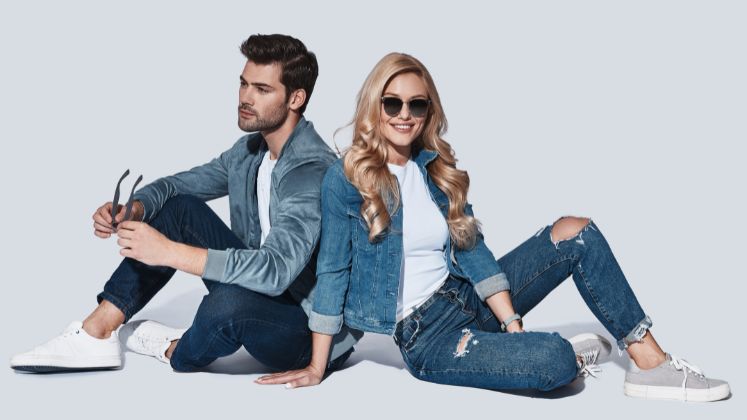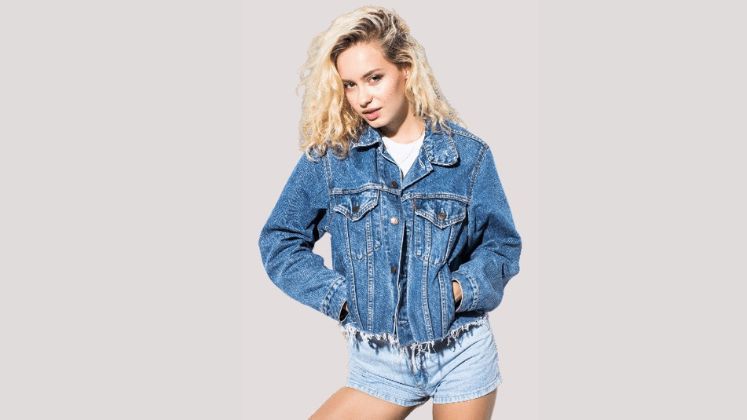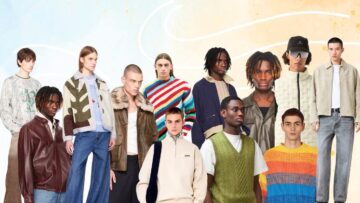Forget economic slowdown – India’s denim market is rocking a different tune. While other sectors might be feeling the blues, denimwear is experiencing a vibrant resurgence. From established giants like Levi Strauss and Pepe Jeans witnessing explosive growth to the rise of innovative D2C brands like Freakins and Snitch, this story is stitched with ambition and resilience. The Indian denim market is booming at an impressive average rate of 8 per cent to 9 per cent annually. Projections suggest it will skyrocket to US $ 9.15 billion by 2026, up from US $ 6.15 billion in FY 2023, as suggested by multiple market studies.
In India, Levi Strauss, the American denim brand, experienced a whopping 54 per cent rise in its FY 2023 net sales, reaching Rs.1,781 crore as compared to Rs.1,154 crore in FY 2022. Last year, Levi Strauss said India is now the largest market for them within Asia and the sixth largest globally. “As the world’s second most-populated country, India is an attractive market for aspirational apparel brands as rising disposable incomes cause the consuming base of the pyramid to broaden further. The Indian economy is on course to be amongst the top economies in the world. The key factors driving the India consumption story include a large proportion of the young population, rising urbanisation, growing affluence, increasing discretionary spending and deeper penetration of digital,” said Levi Strauss in its latest annual report.
Denim giants report robust finance, emphasise store expansion
Levi’s unveiled its largest store in Asia last year, gracing Bengaluru’s vibrant shopping district of Brigade Road. Spanning across a retail space of 7,521 square feet, the store showcases an array of the brand’s cherished offerings – from its iconic 501, which celebrated its 150th anniversary last year, to its classic trucker jackets.
In addition to the extensive product selection, the store features a tailor shop with skilled professionals offering alteration and restoration services. Customers can also personalise their purchases through embroidery, patches and pins, adding a unique touch to their Levi’s apparel.
| 1600 With an annual capacity of over 1600 million metres, India has the second-largest installed capacity for denim fabrics in the world, behind China. |
“India continues to be a priority growth market for Levi Strauss & Co.,” said Amisha Jain, Managing Director and SVP, South Asia, Middle East and Africa at Levi Strauss & Co.
Whereas Pepe Jeans witnessed an impressive 54 per cent growth in FY 2023, achieving net sales of Rs.560 crore compared to Rs.364 crore in FY 2022. With ambitious aspirations, the brand aims to reach a sales target of approximately Rs. 2,000 crore within the Indian market. Manish Kapoor, MD and CEO of Pepe Jeans India, outlined plans to bolster its retail presence by adding over 100 stores in the coming three years.
Under the ownership of the Spanish global fashion group AWWG, Pepe Jeans London is poised for substantial growth, targeting an 18 per cent – 20 per cent compound annual growth rate (CAGR) over the next three to five years.
“With consumer behaviour shifting in the ever-changing retail landscape, we at Levi’s continue to prioritise how we deliver our iconic products and an impactful brand experience, especially to our growing base of young, savvy consumers in India and across Asia,” said Amisha Jain.
Another big player in the denim industry, Arvind Fashions, which hosts a distinguished array of iconic global brands, including US Polo Assn., Tommy Hilfiger and Flying Machine, too experienced growth.
Last year, Arvind Ltd., opened the largest exclusive brand outlet in South India yet, in Bengaluru, offering denim customisation. This exclusive ‘The Arvind Store’ houses some of the best brands under the Arvind Ltd. umbrella, including retail brands such as US Polo Association, Primante, Fabric of Arvind, Tresca amongst others and boasts an area of 4410 sq.ft. The store has custom tailoring solutions which people can use to customise their denim in terms of size, fit and choice of buttons, rivet, labels, thread colours as well as with their initials.
Without divulging the brand specific data for Flying Machine and US Polo, Shailesh Chaturvedi, Managing Director and CEO, Arvind Fashions Limited said, “When I look at the number of Flying Machine and Arrow or U.S. Polo, there is a decent growth in the current market condition of all three brands.”

| “Today consumers are constantly seeking variety and newness in their wardrobes leading to greater interest in different types of denim apparel beyond jeans. Articles like denim shorts are better suited to warmer climates & this adaptability further increases their appeal. Further technological advancements in denim fabrics have led to lighter, softer, more stretchable and flexible denim fabrics allowing for a broader range as well as acceptability of non jeans products.” Manjula Gandhi, Chief Product Officer, Numero Uno |
Denim and casualwear brand Killer Jeans plans to open a new 1 lakh square foot warehouse to fuel its continued retail expansion. The brand is also harnessing technology to boost its operations in partnership with Logic ERP. Lakhbir Singh, Brand Head at Killer Jeans, claims that by using this technology, the company has been able to rotate its inventory six times annually.
Under the umbrella of its parent company, Kewal Kiran Clothing, which predominantly focuses on menswear, Killer Jeans stands out within a robust brand portfolio that includes Integriti and Lawman. Demonstrating a strong performance for the September quarter, Kewal Kiran Clothing witnessed a 16 per cent year-over-year revenue growth, with a compounded annual growth rate of 12 per cent over the last four years.
In Q2 of FY ’24, the company posted a quarterly net profit of Rs.50 crore, marking a significant increase from Rs.39 crore net profit recorded in the corresponding quarter of the previous year.
Daksh Kapoor, Chief Operating Officer at Kapsons Group, emphasised that the year-round appeal of denim is playing a critical role in its continuous growth. “Denim jackets, once limited to winter, are now year-round staples due to technological advancements. Denim’s durability and low maintenance align with the modern consumer’s preference for long-term, hassle-free fashion.”
He added, “The evolving trend of ribbed detailing, beginning subtly years ago, has now become a major fashion rage, transforming from a mere functional feature to a prominent aesthetic in denim fashion. This, along with the adoption of unisex styles, further contributes to the dynamic evolution of denim fashion. These shifts impact consumer behaviour by emphasising comfort, versatility in formalwear, seasonal adaptability and the perception of fashion as a lasting investment.” Kapsons Group, overseeing 25 stores across India, claims to be the first to introduce international brands to North Indian customers.
| Store Front
Levi’s had 381 stores in India as of 5th October 2023 Bestseller India has 313 exclusive brand outlets and is present in over 1785 shop-in-shops in external multi-brand stores throughout India. Pepe Jeans has 250+standalone stores (700 department store counters, 700+ multi-brand counters) Wrangler has 54 physical retail stores Killer products are retailed across EBOs (130+), K-Lounge (240+) Large format stores (350+) and MBOs (2000+) As of 30th September 2023, Mufti had a pan-India presence consisting of 404 EBOs, 71 LFSs and 1,332 MBOs Spykar is present across 2250 points of sales, which includes 300+ Spykar exclusive stores, large format retails and all major e-commerce platforms Lee has over 31 standalone stores in India Apart from over 50 Gap shop-in-shops opened by Reliance Retail, Gap has opened 3 standalone stores in India in 2023. There were 281 Allen Solly stores in India as of 21st December 2023 By the end of 2023, Numero Uno had 350 stores |
D2C brands, with a big focus on denimwear, are also doing well. Recently Snitch secured Rs. 110 crore in Series A funding. The investment will catalyse Snitch’s expansion in talent, technology and an offline retail strategy. “Snitch has served a vast array of pin codes across India, underlining its wide reach and commitment to quality and innovation,” said the company in a press release.
Snitch has achieved a turnover exceeding Rs.100 crore in the fiscal year 2023. The brand is now positioned for extensive growth, intending to open more than 100 offline stores across the nation in the next 4-5 years.
Other such D2C brands focusing big time on denimwear are High Star (acquired by Mensa) and Bewakoof. Driven by a surge in brand consciousness and a heightened awareness of fashion trends in Tier-2+ cities, denim-centric brands are aggressively penetrating these markets.
| € 10.02 bn In 2022, the value of denim imports into Europe, including intra-EU imports, amounted to € 10.02 billion, up from € 8.33 billion in 2017. This corresponds to over 830 million units of clothing in 2022. Men’s and boys’ denim accounted for a larger share (57 per cent) of the segment ‘at € 5.75 billion’ in 2022. Women’s and girls’ denim represents the remaining 43 per cent with a total value of € 4.27 billion in 2022. |
Casualisation of Fashion
According to experts, due to Covid-19 and the whole ‘Work From Home’ scene, everyone’s leaning more towards casual vibes. It’s changing the game for work attire, with offices going all-in on casual dressing. This shift has boosted the popularity of ‘smart casualwear’, especially amongst the young professional crowd. Big name formalwear brands are catching onto the trend, rolling out cool casual lines and denim collections. Take the case of Van Heusen, which came up with the ‘Tech Denim’ collection, riding the wave of casual vibes and offering a fresh take on smart casualwear. The versatile nature of denim, blending both comfort and style, positions it as a key driver in the flourishing casualwear segment.
“The growth of non-jeans segments within denim, such as jackets and shorts, has surged due to increased demand for versatile and stylish casualwear. Consumers seek fashion flexibility and denim’s adaptability to various clothing items meets this demand,” said Shivani Aggarwal, Founder of ANI Clothing.
Focus on Womenswear
The women’s segment has been securing a considerable market share in the denim market. A notable example highlighting this trend is Freakins. The Mumbai-based start-up, founded by Puneet Sehgal, Shaan Shah and Sachin Shah, secured US $ 4 million in a seed round last year to support its growth and expand its supply chain capabilities. Launched in 2019, Freakins initially concentrated on women’s denim. However, last February, it extended its offerings to include men’s denim, positioning itself as a contemporary, Gen Z denimwear brand.
Approximately 50 per cent of Freakins’ sales are generated through its own direct-to-consumer (D2C) website, while the remaining portion is derived from online marketplaces such as Myntra and Ajio. During the fiscal year 2022-23, the company achieved gross revenues in the range of Rs. 22-23 crore, with a goal to transform into a Rs. 100 crore brand by 2024.
Puneet explains that he and his Co-founders observed a noticeable absence of high-quality denim choices for women. They noted that major brands were frequently slow to embrace trends and often created jeans without considering the diversity of Indian body types.
According to Wazir Advisors, the women’s share of the market will balloon to 14 per cent by 2026, from 11 per cent today as workwear, western trends and mix-and-match styles take centre stage.
In the past decade or so, women’s denim has become popular in big cities and smaller urban areas, especially amongst the younger crowd. The majority of the market is controlled by smaller, unorganised brands in India. However, newer brands are also making their mark.
Even big brands like Spykar, with a widespread presence across 200 exclusive outlets and 900+ multi-brand outlets pan-India, are shifting their focus towards the womenswear market. Sanjay Vakharia, CEO and Co-Founder of Spykar, stated that jeans have become ‘a very significant part of a woman’s wardrobe’ and they are looking to provide an extensive range of options and diverse categories for women.
Transitioning seamlessly into this evolving trend, ANI Clothing, a feminine Ready-to-Wear brand with a strong focus on denim, stands out. “Recent denim manufacturing trends have seen a surge in consumer interest through intricate hand embroidery, stylish sequin and stone work, creative appliqué techniques and innovative panelling. Denim sets, combining versatility and fashion, have also captured attention. These design innovations seamlessly blend traditional craftsmanship with modern denim aesthetics, establishing a distinct and appealing niche in the market,” said Shivani.
Brands’ focus on Sustainability
Recently brands have been caught with the sustainability bug. Diesel recently joined hands with Lee to create an upcycled denim collaboration. This collection is part of the ‘DIESELOVES’ initiative and features upcycled denim, utilising scrap materials to create new, fashionable pieces.
Menswear brand Jack and Jones through its initiative, Protect, stated that it’s committed to core values like ethical sourcing, using recycled materials, water conservation and transparency. With a dedicated focus on organic cotton, Jack and Jones set ambitious goals to substantially elevate its direct-to-farm cotton usage. The brand embraces Bestseller’s direct-to-farm sourcing model to create a secure market for organic and in-conversion cotton as well as a premium payment for the farmers.
Spykar, another prominent denim brand, declared its commitment to sustainability by being a signatory to the S.U.R.E. Memorandum, India’s biggest sustainability pledge committed towards improvement in sustainable practices, by 2025.
Meanwhile, Mufti Jeans claims to have used recycled paper bags in store, re-working and re-using old metal buttons and experimenting with recycled polyester instead of man-made materials.
| 7 On an average, in the USA, women own 7 pairs of jeans and men own 6 pairs. |
Manufacturers are also upping their sustainability game
In the past decade, the emphasis on sustainability is only intensifying and India’s denim manufacturing giants are at the forefront of this movement. Driven by conscious consumers and eco-friendly innovation, major players like Aditya Birla Fashion and Retail Limited (ABFRL) and Arvind Fashions are rewriting the rules of denimwear.
ABFRL, home to iconic brands like Forever 21, Louis Philippe, Allen Solly and Peter England, is pioneering the adoption of Lyocell, a sustainable fibre derived from renewable eucalyptus trees. Unlike cotton, eucalyptus does not strip the soil of its resources. It requires less water, fewer pesticides and fewer chemicals during the manufacturing process. Once incorporated into garments, lyocell maintains its superiority over cotton in several ways. It resists colour bleeding, shrinking and fading even after multiple washes, drapes in a wrinkle-free and soft manner and is particularly suitable for sensitive skin due to its hypoallergenic, anti-microbial, anti-bacterial and anti-fungal properties.
Birla Cellulose makes it easy for consumers to identify lyocell. Birla Excel, the branded lyocell fibre from Birla Cellulose, is eco-friendly, derived from renewable resources and manufactured through a closed-loop process. It biodegrades within six weeks, making it easy to discard without contributing to landfills. Due to its moisture-absorbing properties, it is also ideal for individuals with sensitive skin. Consequently, it is used in a wide range of applications, from non-woven face and baby wipes to denim and casualwear.
| 1.25 billion Consumers worldwide buy 1.25 billion pairs of jeans annually. |
Coming to Arvind Fashions, the leading lifestyle company in India is making sustainability a cornerstone of their fashion empire. The group claims that it remains focused on continuous optimisation of the dyeing process in its operations. It has taken a significant innovation leap in this journey during FY ’23 with the development of a single-bath yarn dyeing process for cotton/PET blends. According to the brand, this process uses novel dyes that can be applied to both cotton and polyester fibres in a single step. This eliminates the need for two separate dyeing baths, which reduces water consumption, energy usage and wastewater production.
They have also developed a new approach to denim finishing that uses bio-based materials. This approach replaces synthetic indigo dye stuff, pre-wetting chemicals, and auxiliaries used in sizing and finishing with bio-based materials.
Indian manufacturers possess the potential to meet the increasing demand for sustainable materials. A case in point is the US-based leading fashion brand, Patagonia, which is using handcrafted khadi denim fabric for crafting denim apparel. Collaborating with textile major Arvind Mills, Patagonia procured approximately 30,000 metres of khadi denim fabric valued at Rs. 1.08 crore from Gujarat.
Mills and Manufacturers crown comfort as king
Manufacturers and mills are observing a shift in the denim industry towards prioritising comfort, driven by evolving consumer fashion preferences and the lasting impact of the pandemic. Casualwear and comfortable fits have gained prominence, reflecting the changing sensibilities of consumers. Srihari Balakrishnan, Managing Director of Sri Kannapiran Mills Limited, the flagship company of US $ 250 million KG Group based in Coimbatore, Tamil Nadu, highlighted the use of Spun Polyesters and Viscose Yarns, emphasising the industry’s recent innovations in spun Tencel and Lyocell yarns.
| Top denim mills and their capacity | |
| Company name | Capacity* |
| Jindal Worldwide | 145 |
| Arvind | 125 |
| Vishal Fabrics | 105 |
| Aarvee Denims and Exports | 85 |
| Partap Spintex | 80 |
| Nandan Denim | 110 |
| Etco Denim | 39 |
| Raymond UCO Denim | 56 |
| Bhaskar Industries | 44 |
| Oswal Industries | 40 |
*million metres per annum (approx. figures)
In tandem with this perspective, Rishabh Bansal, Director at Partap Spintex, with a capacity to produce 10 million metres per annum, underscored the growing demand for bamboo fibres, viscose fibres, to even Tencel fibres. “The popularity of these fibres is mainly for the feel and softness since people want premium fibres like re-spun yarns with combed compact seams for added comfort since the market is leaning towards comfort.”
According to Arvind Mathur, CEO of Raymond UCO, with a capacity to produce 44 million metres per annum, the focus on innovation in fibres and fabrics revolves around sustainability, particularly with the utilisation of ReGen cotton. The industry is actively working to boost the proportion of sustainable fabrics, emphasising the development of commercially viable options that incorporate higher percentages of recycled and sustainable components. Ongoing innovations in fabrics and fibres are driven by the consumer preference for comfortablewear and fits, aligning with evolving comfort expectations.
“Fits are getting relaxed with more comfortable fits and straight fits becoming the norm rather than slim fits or skinny fits since internally proportions are changing. In particular, 4-way stretch is becoming popular since it is a comfortable fabric for denim,” stated Dhwanit Gohel, Director, Zedex Clothing. The factory produces nearly 400,000 garments per month for both domestic and export markets, clocking over US $ 12 million of annual turnover. Dhwanit stated that while there is a growing sustainability trend in the industry, pricing remains a significant challenge. Nevertheless, the rising denim consumption in India, combined with the expansion of retail options, establishes the Indian market as robust for manufacturers.











